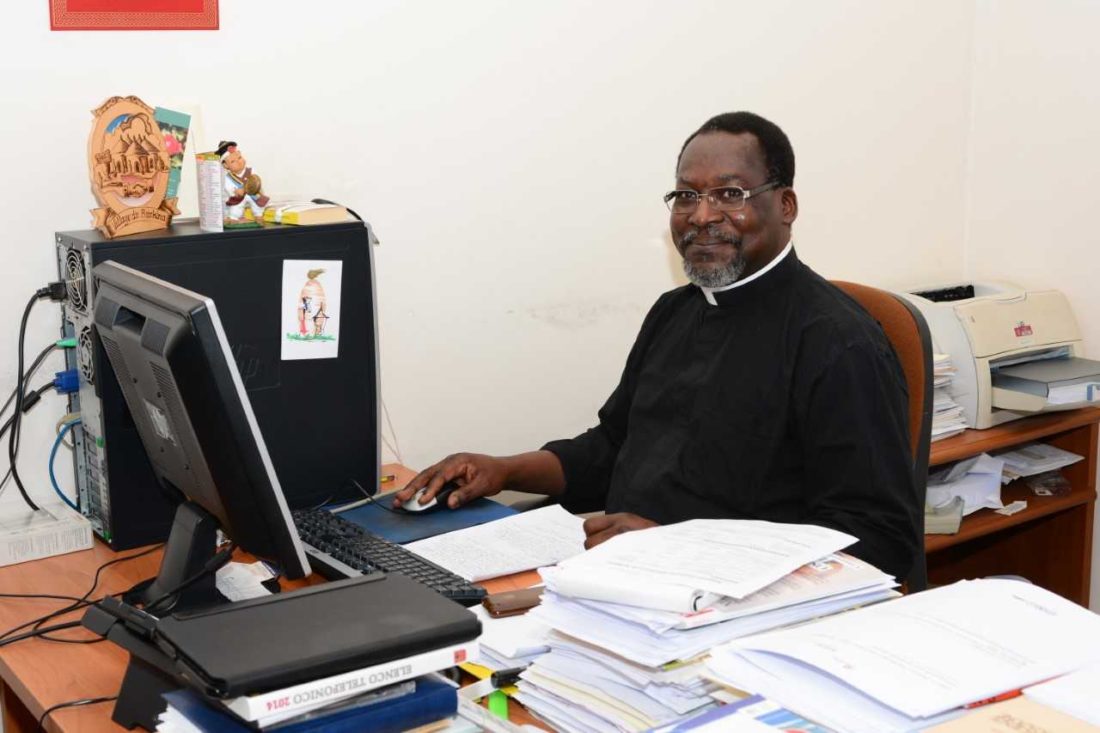RETHINKING AFRICAN THEOLOGY is the new column for debate and training launched by La Croix Africa, in collaboration with Prions en Eglise Afrique. It offers a platform for thinkers to fruitfully reflect on the future of the Church and of theological thought in Africa.
In June, Msgr. Janvier Yaméogo, priest of the diocese of Koudougou, in the center-west of Burkina Faso, in service with the dicastery of communication at the Vatican, offers a reflection on ecclesial communication.
The discourse and perception of the Church vis-à-vis the communication media, has gone from mistrust and moralizing discourse to welcoming “wonderful technical discoveries” (Cf Inter mirifica n.1) and commitment to “digital culture”. The Pope is on Twitter and the Holy See has a Ministry for Communication wanted by the Second Vatican Council. In 2003, however, Frédéric Antoine explicitly titled, “The great misunderstanding. Has the Church Lost Culture and Media? » a book where he invites us to reflect on a new « being in the world » of Christianity. Dealing with communication in the Church in the era of new technologies will only allow us to touch on a few theological and pastoral questions, many are the anthropological and socio-cultural challenges.
The history of communication from the beginnings of writing to our digital age is characterized by the need to record, to have traces; from the physically drawn line to the digital recording that brings together all the technologies in the smartphone in the palm of the hand.
History of the Church and History of Communication
The history of the Church is also a history of communication as a gift from God to all humanity. The identity and the mission of the Church reside in the pursuit, perpetuation of this free communication of God who wants to gather in unity his scattered children (Cf Communio et progression n.18); since the Church is “in Christ, as the sacrament — that is, both the sign and the instrument — of intimate union with God and of the unity of all mankind”, communication is inscribed in its DNA in a context characterized by a kind of disappearance – assimilation of the media in technology oriented towards the interpersonal relationship. Note the quasi-sacramental, even magical aspect of communication technologies.
The history of communication highlights the intrinsic link with culture, education and transmission. The transformation of media to digital convergence is a continuity to preserve memory from oblivion, with increasing storage capacity for preservation (big data) and instant accessibility in time and space. Digital technology thus transforms our relationship to knowledge and science, to memory, to truth, to time, to space and above all to authority and institutions.
Challenges
Given their roles and interactions in human and social mediations, knowledge technologies, traditions and rites, instances of conservation and transmission, are a crucial anthropological challenge. For the Church, three levels of challenge can be classified: at the cultural level (Redemptoris mission n.37) in the choice of instruments and strategies to reach the addressee; pastoral for the accessibility of the Message to all for example the Message Urbi et Orbi (to the City and to the World) of the pope; finally at the ecclesial and ecclesiological level: which Church and who is the Church, institution, hierarchy and Church-Media relationship, the horizontality of exchanges and the question of truth and authority… In connection with the hypothesis that the Protestant reform was a side effect of Gutenberg’s revolution, what scenario are we heading towards today? Can we even perceive what will happen when everything is changing so fast?
Whatever the religious obedience, the containment of the Covid-19 pandemic has forced digital communication with the questions raised by devotion and online worship. This climate has also highlighted the porous boundaries between truth and lies, science and opinion, rumours, conspiracy theories, propaganda and disinformation…
Technological hybridization
The recent sharing of data between WhatsApp and Facebook has sparked unsuccessful protests over the “alleged” violation of privacy standards for commercial purposes. There are frictions between law, justice and social networks with the tendency of the latter to set themselves up as courts. Users, despite appearances, are tracked and profiled, even manipulated consumers. Algorithms and artificial intelligence involve ethical and legal issues at the global, geopolitical and strategic level.
Here we are almost under control due to the fact of technological hybridization with human beings and everyday things, our being in the world seems to be in the hands of big data. Pope Francis pleads for the implementation of an ethic of freedom, responsibility and fraternity in order to prevent technological progress from generating further economic, educational, technological, social and cultural inequalities. (Fratelli tutti n.205) The main challenge of communication for the Church in the digital age is probably the commitment for a more just and fraternal world, in solidarity with all, so that science and technology serve peace and integral human development.
Bishop Jan Yaméogo

